For the previous segments, here are the links to Part A, Part B, Part C and Part D of this retrospective of the first 100 anime covered on the blog.
Best Episode:
Honorable Mentions:
Casshern Sins (2008-9), whilst held as an underappreciated work, didn't captivate me, an incredibly bleak post-apocalypse reinterpretation of Tatsunoko's Casshern character, imagining him as the cause of a rust which kills robots slowly whilst the world is dying for everyone else. Probably the issue was that it is was too dark, too repetitive in its tone without ever feeling like the show was going for a real emotional power, but there was a curious curve ball in how, for one episode 18, The Time I've Lived and the Time I Have Left, we get the kind of freakout episode about the main female character Lyuze that feels like when Neon Genesis Evangelion (1995-6) went weird in its later episodes due to Hideaki Anno's personal problems effecting the production. For one episode there's live action, avant-garde techniques, alternative reality moments, and the jarring move of imagining this character as a sex worker, all of which is strange but certainly memorable as an episode.
Worthy of mention too, for another bleak series, you are made fully aware in Puella Magi Madoka Magica (2011) when the first death of the series is so abrupt and disturbing this is not going to be a happy show about magical girls. To reveal which episode this takes place in is a spoiler, but imagine how this warning shot was felt by the first Japanese viewers of the show before we all became aware it was going to be dark.
Finally there's episode eleven of Ghost Hunt (2006-7), Ghost Story in the Park?, which is the only one story episode of a series which is split off into narrative arcs, the one clearly meant to be the overt comedy episode as the central gang of ghost exorcists, which vary between paranormal specialists to even members of numerous religious groups like a Shinto shrine priestess and a Catholic priest being comrades in action, having to deal with a ghost that dumps water on couples in a park out of spite. It turns into a bitter sweet emotional episode, with a ghost that (usually a series about evil and malicious phantoms) is entirely good and just with a tragic tale to them, but the one moment the show just rested fully on the comedy that did exist throughout was a lovely change of pace.
5. The game show episode of Ergo Proxy (2006) [Episode 15: "Live Nightmare Quiz Show, 1 Million Yen in 30 Minutes! / WHO WANTS TO BE IN JEOPARDY!"]
Another series which didn't captivate me was the sci-fi dystopian show Ergo Proxy, but only because the ending fell on its face. The series got better when it pulled the rug out from under the viewer, starting with the female lead chasing down rogue robots in a dystopian city, to the [mild spoiler] reveal the city was not the last in the world but that there were various domes across a desert wasteland. The exact moment the lead characters got out the dome lead to some good episodes, as it also lead to the lasting memory of many viewers that the one-off stories were held as the best rather than the main plot. A strong candidate was Episode Nineteen, the tale where the tiny robot girl Pino, who was one of the three main leads got an episode in a Disneyland parallel city, the robot far more able to smile than anyone in the character costumes and leading to some nice subversion of Western animation for an emotional beat.
Truthfully though, you have to talk about the game show episode, because how ballsy is it to have an abrupt and weird episode entirely structured like a game show appear out of nowhere in the series? More ballsy is that this episode, where the leads are contestants, includes very important details for the major plot, an inspired way to get through exposition that had to be praised.
4. The Anime Production Episode of Paranoia Agent (2004) [Episode 10: "Mellow Maromi"]
On my initial viewing of Paranoia Agent years ago, the entire segment between Episodes eight to ten where it drifts briefly away from the main story to episodic side tales were interesting but seen as the weaker moments. In hindsight they showed that Satoshi Kon was just as interesting here as in a single plot; one about a suicide club was sadly censored for the UK release, in a terrible decision to this day from the British Board of Film Classification, but is still a poignant take on the subject, whilst the one entirely around gossiping and making up tales about the central figure, Lil' Slugger, who attacks people is the best kind of black humor. The best of them all, however, feels like an actual unloading of all the stress of producing televised anime as its about the stressful life of creating an anime, right down to digressions explaining different job roles to the viewer for educative means. Its a dark take, as everyone's stressed and in this world people start disappearing or dying off one by one, but the honesty is absolutely memorable.
3. The "Nue" arc of Mononoke (2007) [Episodes 8 and 9]
It's not just I'm a fan of Chiaki J. Konaka, a divisive anime screenwriter who can be difficult; its that, with a series which is made up of five arcs over twelve episodes, all of them strong, the Nue arc had to really stand out from strong competition. And it sure does, the kind of peculiar story only unique to anime and manga, about an incense competition for an ancient piece of wood, which may have led to tragedy, and even manages to have a game based on the individual chapter names of The Tale of Genji as a major set piece. We forget anime is a Japanese creation, infused with their culture, but when you get something this undeniably idiosyncratic to Japan's own culture, probably esoteric even for a Japanese otaku to watch at points, its something to bask in too.
2. The ???? episode of gdgd Fairies (2011/2013)
Trying to choose an episode of gdgd Fairies is a flawed concept because so many segments are inspired. First episodes of the first season? Bungee jumping bread eating competition where the platform is in outer space? Voice actress Satomi Akesaka beginning the running gag of an old woman polygon figure, purple hair and lingerie costume, at the "Dubbing Lake" that would lead to a side character being naturally created. The entire first season? Between the house one of the titular fairies buys which is haunted by the traps of a Super Mario level to the final episode, set as a piss take of bleaker finales of anime series which runs with the joke to even darker levels, there's so much already there.
Then the second series appears and it manages to up the ante in memorable moments. The entire multi-episode time travel narrative which is signposted to the point you could rewatch previous episodes and spot what the jokes are leading up to. The introduction of three new characters. The entire episode set at a hot springs, which I did actually consider choosing for how strangely sweet it is. The final episode, whilst the first series' final episode is the strongest, set at a school. Too many moments stand out to choose, so they are all getting the second spot...
1. The Final Episode of School Days (2007) [Episode 13: "School Days"]
...the first place, however, could only go to one episode, the titular "School Days" episode of the infamous series School Days which gained the show's notoriety, pulled off the air due to tragic timing to a real murder, and was built up to with all the agonizing melodrama and worst hormone driven decisions of its cast to this nasty finale. Even knowing a bit of the ending didn't spoil how out there the series would end in terms of falling into a different genre which, oh boy, gets gruesome and over-the-top out of nowhere after punching the viewer in the gut repeatedly over the previous episodes. Also it wasn't spoilt because of how the culmination is more impacting having seen the whole show. Arguably too, having the fate of one character spoilt actually made School Days even more meaningful for myself as there was a dreaded sense of fate looming over the narrative, and a greater sense of tragedy as the first episode or so suggests an innocuous and eye rolling harem drama only for things to turn sour quickly. Nothing else should've gone here as School Day's finale is still lingering in my memories stronger than all the other candidates.
====
Underrated Gems
Honorable Mention:
Call Me Tonight (1986), an obscure OVA sounds on premise, a sex hotline staff member trying to help a man who turns into a tentacled beast when he gets sexually aroused, lurid and gross but is an incredibly prescient satire on hentai and the depiction of sex in anime, more poignant as it was only in the early eighties that the OVA market was created and hentai (pornographic) anime, including deeply problematic work that'd never be allowed to be released in the West to this day, was being created. Only thirty minutes long, this is a little horror-comedy gem.
5. Genius Party (2007) [REVIEW]
Considering Studio 4°C have a reputation for great experimental animation, including the early home for talent Masaaki Yuasa, isn't worth the studio having a victory lap by way of an anthology which include legitimate legends among the roster? Genius Party does have the divisive Limit Cycle, an esoteric foray into philosophy with a James Dean stand-in which I loved but, in knowledge to how it could be seen as dreadful and pretentious, could induce people to tear their hair out. The anthology nonetheless has Yuasa showing his skills but also a segment I was originally cold on, Shinichiro Watanabe's Baby Blue, which has grown on me. The Cowboy Bebop (1998) director creates a bitter-sweet drama, abruptly punctuated by a subplot about a stolen hand grenade, about a boy and a girl skipping school to be with each other one last time which has planted itself in my heart. Sadly Genius Party Beyond, whilst it had good segments, felt a bit like an afterthought by poor luck when the best segments, or at least the most memorable (for better and for worst) were in the first.
4. Five Star Stories (1989) [REVIEW]
The issue with the adaptation of Mamoru Nagano unfinished magnum opus is that, the prologue to his tale, it barely covers his elaborate mecha space opera and, made behind his back and thus angering him, it'd never get a follow on anyway due to the bad blood involved. Its an absolute shame - Nagamo is obsessed with glamour and spectacle, his androgynous male characters to his incredible ornate mecha designs brought to screen as well as possible, all in a mere piece of this tale that won me over. The best thing is that I wanted more, left disappointed there wasn't anymore. Between the original manga , since 1986 and ongoing, being still unfinished and that Nagano's own directorial feature Gothicmade (2012) was pulled off the market by himself, for whatever reason and occasionally screened, adds a sense of frustration to this joy over this particular anime.
3. Golgo 13: The Professional (1983) [REVIEW]
The Professional has a "guilty pleasure" label hanging over it, like the Sword of Damocles, because the original Takao Saito creation is one which plays on luridness, a cold blooded assassin who merely kills and fucks, with gender politics an issue here even if it does it best to still play such moments off as uncomfortable as they should be. A factor, however, that differentiates this theatrical film from the likes of Crying Freeman (1988-1994) is that its directed by Osamu Dezaki , who bring the finest craftmanship possible and turn this lurid pulp into a piece of dirty yet beautiful art, one which even becomes borderline surreal in some of the inspired artistic decisions that take place. Even in the infamously dated computer effects, in mind they were in the early eighties, still show the experimentation that was brought in to make this film shine with greater artistic craft than this material usually gets. You can still appreciate Golgo 13: The Professional, one of only three animated adaptations of the character despite coming from 1968, even if its hyper-violent and sexy male power fantasy is off-putting at times.
2. School Days (2007) [REVIEW]
Aspects of School Days, which is the one work that has actually had mentions beforehand, are potentially the usually annoying cliches of anime, from the "sexy" (i.e. off-putting) fanservice to the bland big eyed aesthetic. These aspects, even if unintentionally, become artistically perfect however because, in adapting an erotic visual novel, someone had the inspired idea to take the bland male character surrounded by a group of potential female suitors, the stereotypical harem genre, and imagine it going all so horribly wrong, where he turns into a callous (even unintentionally so) idiot and those around him making the worst mistakes in love or blind lust. Whoever came up with this choice, taking the "worst" ending from the source material, deserves a gift of their choice even still because School Days, whilst agony for many just from the comments I read on Crunchyroll, is unforgettable like a much needing scorching of these cliches.
1. Darkside Blues (1994) [REVIEW]
Even without watching the original Japanese language version - where a female voice actress was cast to voice the male lead Darkside in a subversive creative choice - Darkside Blues was an incredible discovery. Flawed, cramming way too much into only under eighty minutes, this Hideyuki Kikuchi adaptation which combines sci-fi with magic, all with the inspired touch that the anti-hero Darkside is not violent in the slightest but succeeds as a pacifist mediator for the good guys unless pushed to a corner, has stayed with me for its unique genre mashing, its atmosphere and cramming so much into itself there's mere scenes which stand out still in memory. I am incredibly sad Darkside Blues never appeared in any of the other awards, but thankfully I could mention it here.
=======
"Guilty" Pleasures
No one's perfect...although in a few of these cases you do get good artistic creation among the misfires.
Honorable Mentions:
Can I call The Humanoid (1986) even entertaining, let alone remotely competent? From the era of eighties OVA mass production, a license from Central Park Media which inexplicably (thankfully) got a UK DVD release is as bland a work you could get, so much so I can reference Alex Cox's Repo Man (1984) in how, on a shelf in that film's world, you could easily replace the cover with a white spread with black text saying "Sci-Fi Japanese Animation" and not bat an eyelid. Yet, with some personality due to its inexplicable obsession with coffee, something this bland and conventional is strangely alluring as a result, probably helped its only under fifty minutes long.
The South Korea animated spectacle Armageddon (1996) is a mess, an obscurity plucked up by Manga Entertainment in a fleeting interesting in South Korean animation, that also got transferred to the DVD era, which is likely never to get a Blu-Ray transfer and is going to be continually confused with another film from 1996 also called Armageddon directed by Michael Bay. A shame as, honestly, it was a charming multicolored puke stain I felt sympathy for in knowledge of those who probably tried their hardest but failed. Unlike Blue Seagull (1994), which ended leaving a nasty taste in the mouth and agony as you saw the poor figures who worked on it in behind the scenes footage, I can at least look back on this other Korean work I covered as a bonus review and admit it was fun to experience.
Now the next two aren't "Guilty Pleasures", but they are here as, in all seriousness, they got negative reviews but I want to revisit them, even potentially for new reviews if I drastically change my mind, here in this list because there's enough between them to hesitate on the previous negative judgement. Black Rock Shooter (2012) is style over substance, or seemed to be, its mashing of psychological drama in a school, where the villain is (mild spoiler) the school councilor of all people with her sinister yet charming cups of coffee, against an alternative reality of insanely bombastic female warriors/mutants fighting each other is a curiosity that hasn't vanished from mind despite my original issues.
The other is Vampire Princess Miyu (1997), which I have already referenced for all its dumb moments and lulls left a lasting mark for its atmosphere and an ending, in spite of its incredibly comical aspects, which suddenly got nasty, tragic and sincerely emotional. Enough, in honestly, that I have fond memories in spite of remembering very well how negative that review was.
Starting this list off proper, however, is Koichi Ohata which fits the award perfectly. Now he has made Genocyber (1994), which has the potential (if revisited on the blog) for being actually a grotesque little gem according to my memory, but M..D Geist II is dreadful in a memorable way. Now before anyone asks, the original M.D. Geist (1986) is frankly average, not a work that's stuck with me in the slightest barring that its required for the context of the sequel, the first OVA a surprise success for Central Park Media that was also loved by their head John O'Donnell, who pushed as hard as he could get to get a "Director's Cut" for the prequel as well as fund Death Force, a gaudy totem of what late nineties anime could be like for all the good shows, films and OVAs. Its magnificently scuzzy and gauche, worthy of rediscovery, but am I aware enough to stick Death Force here for these same reasons.
So it seems unfair to drag Biohazard 4D: Executer down with Death Force, actually one of the most unique works I have covered as it was original part of an interactive ride, the footage managing (cough) to be available to the wide world long afterwards. Its still a lurid early 3D animated short all about the violence and with its visuals touching a soft spot for incredibly dated visuals, Resident Evil for all its acclaim always with a side of schlock to its legacy, but it turned out to be a perfect project for Koichi Ohata surprisingly. He will likely appear on this blog again if I can access his work, though its worth noting after Burst Angel (2004) he sadly, for all the jeers he's gotten over the years from anime fans, vanished into obscurity, a fate no director of his infamy should end up in when he should still be creating divisive anime.
4. Gyo, Tokyo Fish Attack (2012) [REVIEW]
Next is one I am slightly sad to put on the list, because I like this adaptation of the Junji Ito manga of the same name a lot, but I have to put this adaptation of his undead fish apocalypse tale on this list as its ridiculous, undercut by some glaringly obvious 3D models and for being lurid to a comical extent. Some of its changes to the source material are actually of worth, such as changing the protagonist to the female lead and how the apocalyptic ending is depicted, but this OVA feature film also has plenty of absurd moments. It also has a sex scene, whilst chaste, which having never seen even in a trangressive live action film also raised my eyebrows and just adds to the scuzziness of the entire feature, obsessed with farting and rotting evil fish, all of which even if I feel no guilt from, is still a pleasure I admit is funky.
3. Crying Freeman (1988-1994) [REVIEW]
The idea of a guilty pleasure is, to be honest, always a suspicious one as one should never feel guilt for any work you admire or find virtue in. The only exception, which Crying Freeman falls into, is a "guilty pleasure" where, whilst no way near as problematic as Mad Bull 34 (1990-2), there are moments which are deeply uncomfortable and problematic, the late manga writer Kazuo Koike (whilst acclaimed) also notorious in how, in a position where he had to pile on lurid storytelling content to be able to keep a readership to his work over the difficult career of manga production, this meant a lot of explicit material including sexual violence with his female characters. There's plenty of moments in Crying Freeman which will be sexist or just flat out offensive for many, so a warning is required, as well as that "guilty" pleasure term for once being necessary as, when its a lurid and absrd spectacle, I feel no shame, but the few moments which do cross the line I will not defend and wish weren't there.
Thankfully that which isn't off-putting is gleefully over-the-top and, unlike Christophe Gans' 1995 live action adaptation which could only adapt the first chapter, this multi-episode episode OVA is able to go so much further and bring out all the bizarre content from the later chapters. You go from an initial premise of the titular Freeman as a brainwashed assassin only for this premise to be quickly thrown away, all manner of crime and pulp plots to appear, even a cursed ancient sword to be a one story plot, and everyone (man, woman, large or thin) be abruptly nude at random points, frequently and not necessarily for sexual reasons. Its not even by accounts a full encapsulation of the work of Koike, but the experience is insane.
2. "Limit Cycle" from Genius Party (2007)
Ah, as mentioned in a previous awards above, Limit Cycle is a segment which I love but had to put here as, yeah, in combining alchemical and philosophical material in a giant barrage of audio-visual lecture, based around the exaggerated visuals, people are going to despise this segment for all the good will the others have. I will defend the segment, and feel that if you decode the material within it (even painstakingly) it could turn out to have a lot to admire, but this could also be a situation like Neon Genesis Evangelion which, for all its virtues, was notorious for using Christian-Judaic imagery merely for aesthetic reasons. As a result, the Emperor here may or may not be wearing clothes, Schrödinger's Trousers a contrived metaphor for the situation where putting Limit Cycle as a guilty pleasure is a wiser choice.
1. Dark Myth (1990) [REVIEW]
Yet the guilty pleasure I hold closest to the chest is probably the obscurest, one of the titles part of my pet obsession "The Collection", a series of old licenses Manga Entertainment brought back out on DVD from VHS, most of which will likely never be re-released again. A shame as, whilst I am probably one of Dark Myth's sole fans, aware of its limitations, its a strangely atmospheric horror anime I just found entertaining, stuck in my mind irregardless of its lack of reputation. Its a perfect choice, an idiosyncratic favourite no one else likes but me.
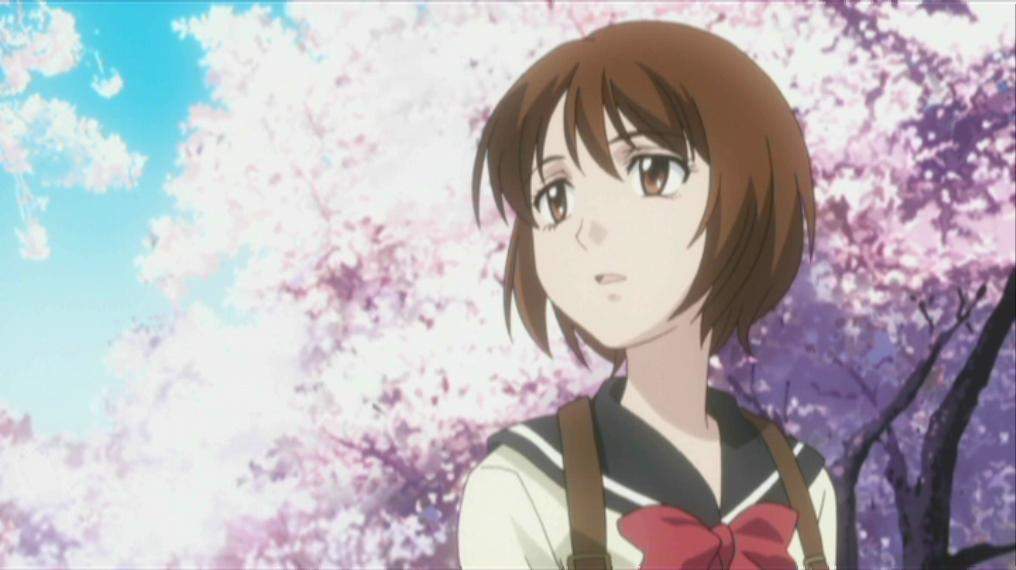

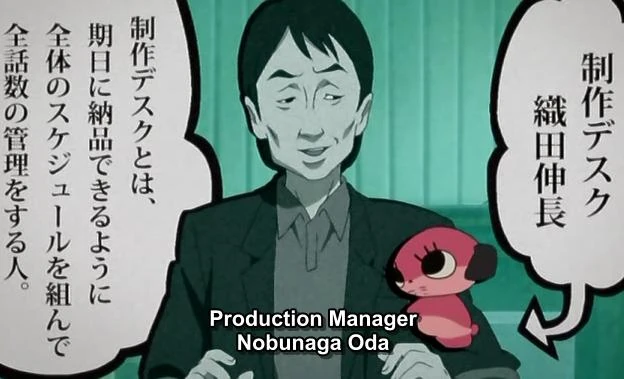
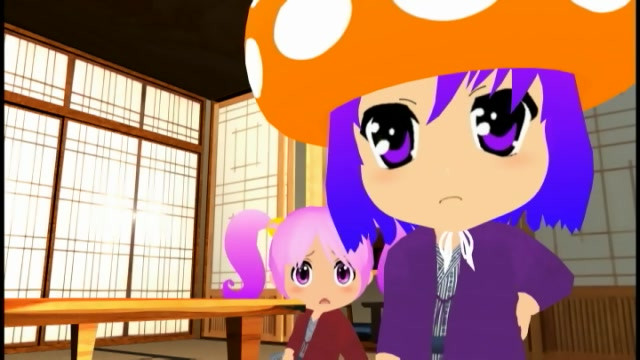





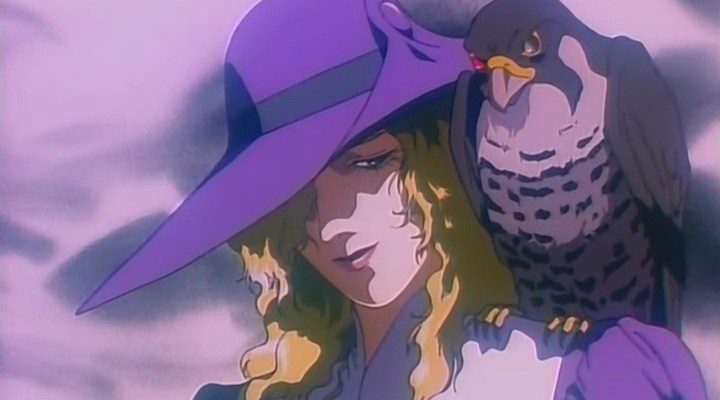


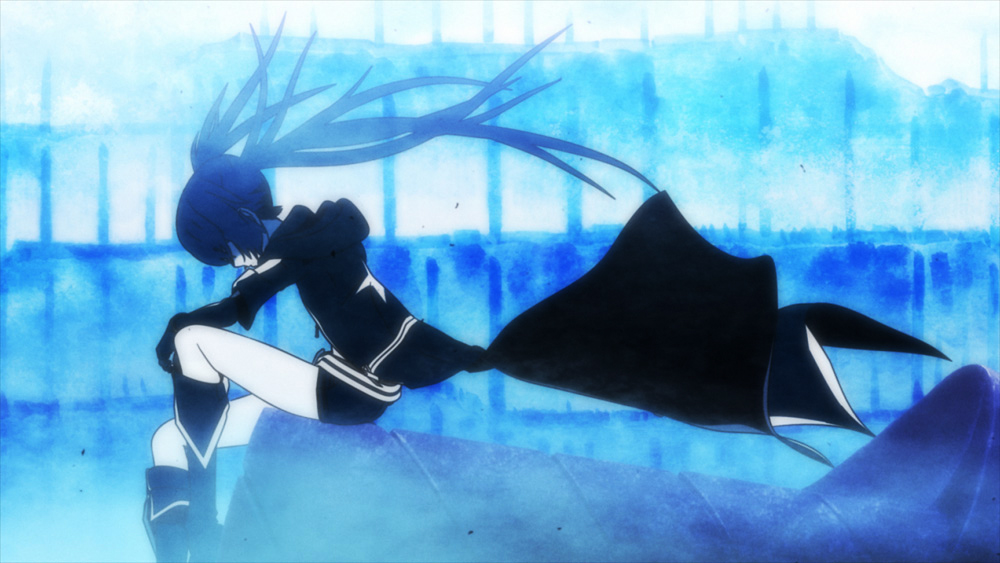


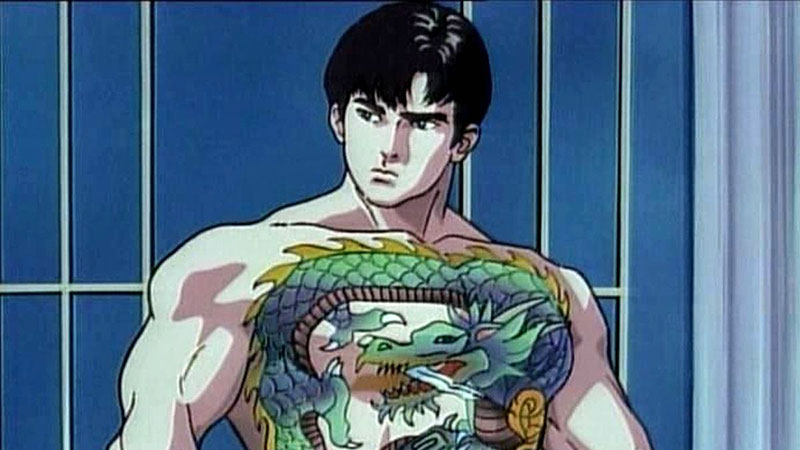


No comments:
Post a Comment